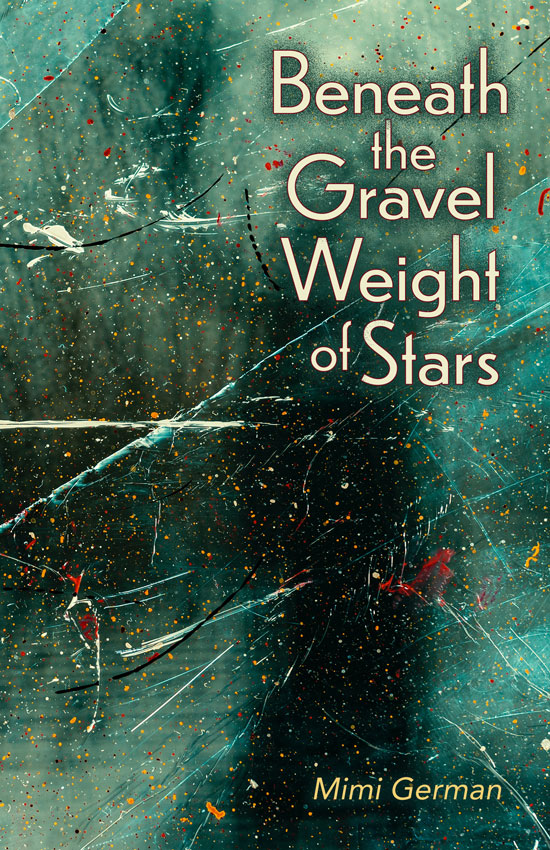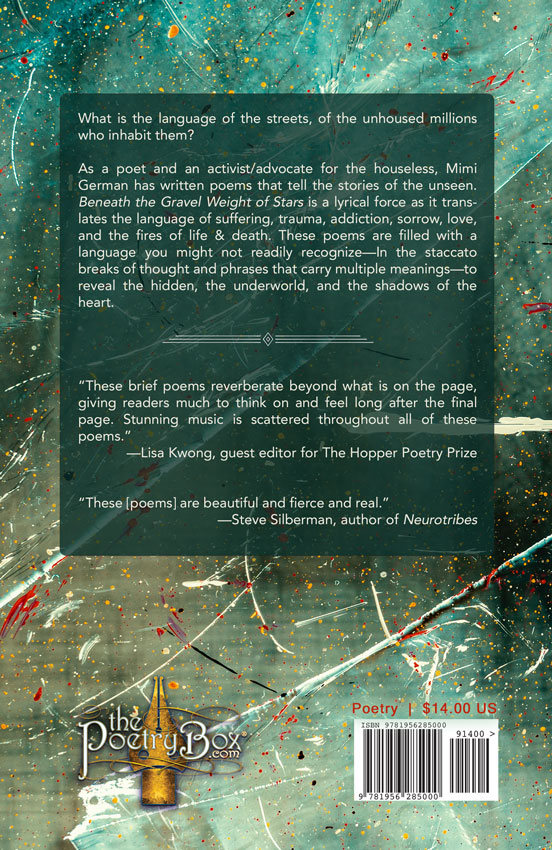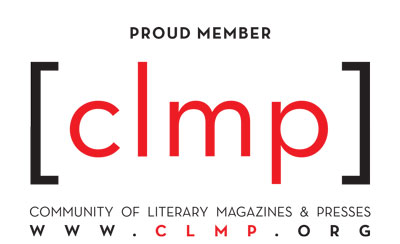Description
Beneath the Gravel Weight of Stars
by Mimi German
Finalist in The Poetry Box Chapbook Prize, 2021
What is the language of the streets, of the unhoused millions who inhabit them?
As a poet and an activist/advocate for the houseless, Mimi German has written poems that tell the stories of the unseen. Beneath the Gravel Weight of Stars is a lyrical force as it translates the language of suffering, trauma, addiction, sorrow, love, and the fires of life & death. These poems are filled with a language you might not readily recognize—In the staccato breaks of thought and phrases that carry multiple meanings—to reveal the hidden, the underworld, and the shadows of the heart.
ENJOY A VIDEO OF MIMI READING FROM THE BOOK:
Mimi German — A Featured Poet on The Poetry Box LIVE (February 2022)
About the Author

Mimi German is a poet, an activist, an organizer, and an advocate and co-founder of Jason Barns Landing, a houseless community and transitional village in St. Johns, Portland. She is also a co-founder of People’s Housing Project based in Portland, Oregon. Her poems have been published in The Hopper, The Mantle, Three Line Poetry (Vols. 51 & 52), New Verse News, and recorded and archived as testimony in Portland City Council sessions from 2017- 2020. Mimi divides her time between living in the remote wilderness of Steens Mountain and Portland, Oregon.
Early Praise for Beneath the Gravel Weight of Stars:
What does it mean to be housed in this increasingly complex world? What does it mean to be houseless? Beneath the Gravel Weight of Stars (formerly titled Eyes of Horse Hair) explores these questions with lyric, evocative constellations of images, where we see how lavender begs to the sky between the hours, and that shows—and evokes—so much, without having to be explicit. These brief poems reverberate beyond what is on the page, giving readers much to think on and feel long after the final page. Stunning music is scattered throughout all of these poems.
—Lisa Kwong, guest editor for The Hopper Poetry Prize
These are very fine poems; I would not be ashamed to have written them! How I would like to see them in a book!
—Cecile Pineda, author of Entry Without Inspection
and Apology to a Whale: Words to Mend a World
These are beautiful and fierce and real.
—Steve Silberman, author of Neurotribes
and TA for Allen Ginsberg









Heather Mattioli –
I hope you are prepared for the journey you are about to embark on in this collection of poetry, Beneath the Gravel Weight of Stars, from Mimi German. Her poetry demands a certain wanderlust from the reader as she takes you by hand, ears, eyes, and mind to touch some of the souls she has so carefully brought to your world.
The journey begins with the first poem in this collection titled, ‘The Crossing.’ We are brought along the street to experience the anonymity of the first soul trekking namelessly through St. John’s in the wet, desolate streets of Portland and we glimpse, ever so briefly, as nature and abandonment intersect.
Once we move through this collection, we begin to notice that Mimi has placed the reader in the poems too. In, ‘The Other Side of the Coffee Shop Window,’ the title has already pointed out the ‘otherness’ that the writer requires you to notice and understand. The imagery that is employed in this poem places the reader in the position of observer and the observed. Looking out the window, ‘lyrids stroke a paper fire’ and the reader is left wondering and knowing that the stars in the sky, ‘the turn aways’ and the ‘crash of cosmic degrees’ are incorporated into all of us through nature.
Admittedly, it may be tempting to assume that this collection is only concerned with nature or houselessness and that would be a fine assumption, but then we would be missing the whole picture. Mimi doesn’t stop here though. This collection shines as she peels back the layers, the meaning for a glimpse of our world as it truly appears. For example, in ‘To Beggar’ the opening line sets the tone for the poem, ‘blueberries fall like dislodged stars’ and we eat up the words that are dropped from Mimi’s pen. The person in this poem is houseless, gathering what they need, all the while being ignored and then we are reminded that the beggar is nature and that is where Mimi’s poetic genius comes into play.
This collection’s last poem, ‘He,’ incorporates everything Mimi’s poetry encompasses. The first line begins with, ‘the fray floats the ground like an unhoused child,’ and the ethereal blur of where nature, poetry, and the political, merge. Make no mistake, Mimi German is a master of language and nature poetry but her absolute magic shines through when we glimpse at her political philosophy. She has taken her time and talent to write down the connection between three of the most important aspects of our world through this work. And now we hear, ‘somewhere a broken violin slurs,’ but it sounds like the stars and poetry.